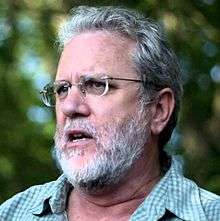Jay Smith (Christian apologist)
Jay Smith (born 1953)[1] is a Christian evangelist, apologist and polemicist. Since 1983, he has been a full-time missionary with the Brethren in Christ Mission with a focus on apologetics and polemics among the Muslims of London.
Dr Jay Smith | |
|---|---|
 | |
| Born | 1953 (age 66–67) |
| Nationality | United States |
| Education | B.A. Messiah College M.Div. Eastern Baptist Theological Seminary M.A Fuller Theological Seminary Ph.D Melbourne School of Theology |
| Occupation | Christian evangelist |
| Known for | Apologetics, Polemics, Historical Critique of Islam and Christianity |
Biography
Early life
Smith was born in India to Brethren in Christ missionaries and attended Woodstock School in India. His grandparents were also missionaries.[1][2] He earned a B.A. from Messiah College and then a masters of Divinity from Eastern Baptist Theological Seminary in apologetics.[1][3][4] He has also earned an M.A. in Islamics from the Fuller Theological Seminary, and a PhD in apologetics and Polemics from the Melbourne School of Theology.
Focus on Islam
In 1981, while studying for his masters, Smith attended a seminar on Islam and noting that there were only 1,500 Christians ministering to Muslims worldwide, he decided to become a missionary to the Muslim world and pursued a second master's degree in Islamic studies from Fuller Theological Seminary.[1]
In 1987, Smith moved to Senegal as a missionary and in 1992, he moved to London[1] where he continued his education at the School of Oriental and African Studies[5][6] and the London School of Theology. In 2001, he halted his education to concentrate on apologetics following the terrorist attacks of September 11, 2001.[1]
In 2010, Smith resumed work on his Ph.D at the Melbourne School of Theology which he completed in March of 2017[1] He helped run the Hyde Park Christian Fellowship, which emphasises the use of Polemics with Muslims alongside Apologetics,[1][2] and has made appearances at Speakers Corner in Hyde Park, London[1][7][8] for over 24 years. Smith also engages in formal public debates with prominent Muslim apologists and scholars including Omar Bakri Muhammad, Azzam Tamimi[3], Shabir Ally[9][10], Anjem Choudary[4], Abdur Raheem Green[6] and Edip Yüksel.[5]
Smith believes that although both Islam and Christianity include radicals, moderates, and liberals, it is radical Muslims that commit violence as they take the Qur’an seriously, while radical Christians who also take the Bible seriously serve others in love. He claims that radical Muslims model their lives on Muhammad, while radical Christians model their lives on Jesus Christ.[10] Smith believes the growth in radical Islam in Britain is due to disaffected Muslims, often minimally religious, returning to their Islamic roots. He says that after reading the Islamic scriptures, (the Qur'an in conjunction with the hadith, tafsir, and sira), they come to the conclusion that the Salafi/Athari understanding is the true form of Islam.[2] Smith also believes that although Western actions in the Islamic world can instigate Muslim discontent, it is the Islamic scriptures that encourage the violence. He also rues the fact that moderate Muslims are not able to challenge the radicals using scripture because he believes the radicals have the scriptural authority.[2] Smith believes that ultimately Muslims and others will realize that the Muslim scriptures, coupled with the example of their prophet Muhammad, are irrelevant to modern times.[2]
Smith's polemical approach has been praised by the Salafi Omar Bakri Muhammad[9] who states:
I feel very comfortable with Jay (Smith, the apologist) – with him what you see is what you get. He is no hypocrite, and neither are Salafis. His words and actions match his heart. He does not pretend by saying soft words about Islam. The Qu’ran calls for debate… Most U.S. evangelicals refuse to debate Muslims, unlike the courage of Jay, who boldly cries "Jesus is Lord!"[11]
References
- Apologetics315: "Apologist Interview: Jay Smith" April 11, 2011
- ABC News Australia: "Jay Smith is a Mennonite and a regular at Speakers' Corner in London's Hyde Park" interview by John Cleary – produced by Noel Debien and Dan Driscoll March 5, 2009
- Apologetics Central: "Jay Smith" retrieved March 15, 2015
- Christianity Today: "Plus: Deconstructing Islam – Apologist Jay Smith takes a confrontational approach" by Stan Guthrie September 9, 2002
- Eurasian College: "Visiting Lecturers- Jay Smith" Archived 2015-03-16 at Archive.today retrieved March 15, 2015
- Christianity Today: "Unapologetic Apologist – Jay Smith confronts Muslim fundamentalists with fundamentalist fervor" by Deann Alford June 13, 2008
- Premier Magazine: "Christian seeks legal advice after being ordered off ladder at Speakers' Corner" by Alex Williams 25 Jun 2017
- Metro UK: "Ladders and soapboxes ‘banned’ from Speaker’s Corner" by Jen Mills 25 Jun 2017
- McRoy, Anthony. "There Can Be No End to Jihad'". Christianitytoday.com. Christianity Today. Retrieved 29 August 2017.
- Calvary Magazine: "Confronting Radical Islam – Jay Smith was a featured speaker at the Calvary Chapel Missions Conference 2010" Issue 43
- Cozzens, Jeffrey B. "IDENTIFYING ENTRY POINTS OF ACTION IN COUNTER RADICALISATION: COUNTERING SALAFI-JIHADI IDEOLOGY THROUGH DEVELOPMENT INITIATIVES – STRATEGIC OPENINGS" (PDF). pure.diis.dk. DANISH INSTITUTE FOR INTERNATIONAL STUDIES. p. 25. Retrieved 29 August 2017.
- Pfander Films
- Evangelium e Apoligia Ministries The Classical Debates – Jay Smith vs. Dr. Shabir Ally
- Apologetics315 "Apologist Interview: Jay Smith" April 11, 2011